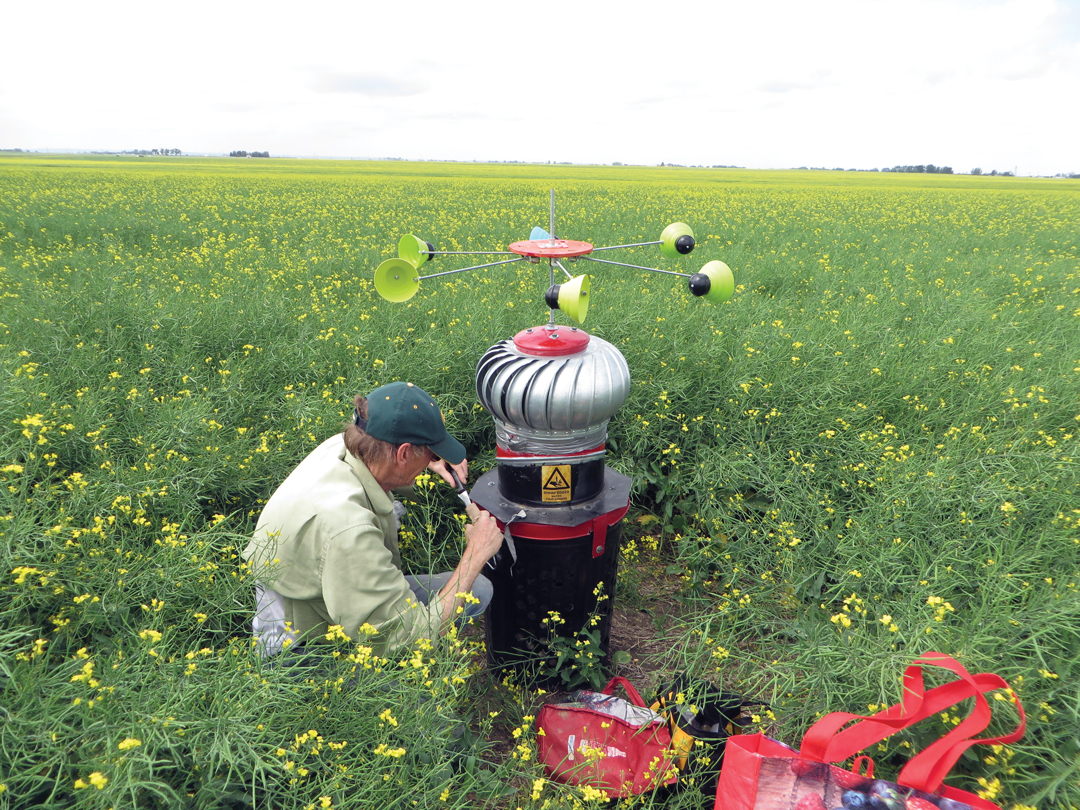BIOTECHNOLOGY LAUNCH PAD
BY CRAIG LESTER • PHOTO COURTESY OF BRENT PUCHALSKI
“Is it really necessary to spray in all cases?” It’s a question posed by Brent Puchalski, a molecular plant pathologist. Up to 75 per cent of all fungicide application is either off target or worse, has no target, he warned.
To overcome this, he established Paramoria Agri-Science, an agricultural biotechnology company, with the help of his father Byron, a retired plant pathologist. The company’s monitoring technology, the Spornik spore trap, tracks fungal presence in field crops. With this information farmers can determine when and where to apply fungicide against diseases such as stripe rust and sclerotinia. It is knowledge that can save time, money and reduce dependence in fungicide application.
The main body of the device is a metal cylinder through which air can pass. As it does so, disease spores are captured by a set of filter cassettes. Puchalski places the device in a client’s field and returns later to retrieve it for analysis.
Puchalski and his father conduct their laboratory work at the University of Lethbridge SynBridge biotechnology lab located in the institution’s Science Commons. Puchalski, who completed his master’s degree in plant sciences at the University of Saskatchewan, was introduced to the Synbridge lab by a business advisor. The facility provides research space and equipment to companies that range in size from small startups such as Paramoria to multinationals.
At SynBridge, Spornik samples are analyzed in a process similar to COVID tests used by doctors and pharmacists. This method can detect the presence of even a single spore. Disease prevalence can then be determined for the immediate quarter-section around the device’s location. “This approach allows us to see a disease encroaching two to three weeks before symptoms appear, which should give farmers lots of time to properly make a [treatment] decision,” said Puchalski.
During spraying season Paramoria clients receive weekly email updates and Puchalski calls immediately if testing indicates action is urgently required. For now, he offers the service only in southern Alberta.
Currently, U of L researchers also utilize the space and they in turn hire biotechnology students to assist with lab work. “We have a really great environment for startups and small independent companies to work out of,” said Laura Keffer-Wilkes, SynBridge manager. The facility sustains a unique science entrepreneurship ecosystem that is further assisted by its southern Alberta location, she added. “It is relatively cheap to work and live in Lethbridge.”
To set up a fully equipped lab capable of facilitating biotechnology research and product development can cost multiple millions of dollars. Companies can save on such expenses when they utilize SynBridge. “They can literally just come in, pay a monthly subscription fee to use our space and get access to our state-of-the-art equipment,” said Keffer-Wilkes. Lab users can also conveniently collaborate with university researchers and recruit and employ students.
Puchalski calls the lab a hidden gem as few such fully equipped molecular genetic facilities are available for use by new companies. In coming years, he hopes to expand the SynBridge team and its coverage area.







Comments